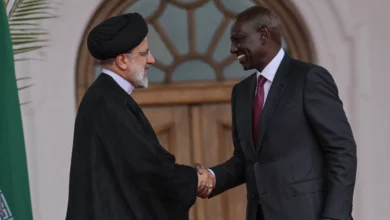Abu Salim Prison, once Libya's most famous prison, has been abandoned since Tripoli fell to anti-regime rebels. Citizens have managed to free its political prisoners.
Al-Masry Al-Youm reporters toured the notorious facility, accompanied by a former prisoner, Salem Ali Salem.
Salem was returning to help free Abu Salim's prisoners, unaware that local citizens had taken the initiative after pro-Qadhafi guards ran for their lives, leaving inmates without food or water for three consecutive days.
According to Salem, he began his prison term there in 1985 for charges which, he said, had both political and religious aspects. He said his only crime was performing the five prayers regularly at the mosque.
"We were six people in a two-meter cell, we spent a lot of time deprived of light and air. We were not allowed to out except for interrogation or torture," he recounted.
But Salem declined to go further into the details of his prison term or the torture he suffered, instead inviting us to go on a tour inside.
We started through the main gate and followed a long tarmac road leading to another gate. Behind it were three huge buildings.
Approaching the first, we were repelled by a nasty smell, and Salem laughed in response. "It is logical – hundreds of people had been confined in this building, and were not allowed to move except for interrogation or torture."
Salem said light and fresh air could not penetrate the cells, which had high humidity, causing many inmates to suffer asthma. He said he is now receiving treatment for his own.
We entered one of the cells, which was in a total mess. We noticed a poster of the the Dome of the Rock nailed to a wall. Lifting it, we discovered a small hole leading to the neighboring cell, which Salim attibuted to an attempt by inmates to communicate with each other.
"Sometimes we used fake names to call each other so as to avoid punishment by the wardens," Salem recounted laughingly. "We were not permitted to knock on the doors except if an inmate died – if we did it to save someone's life, we would be tortured."
We were surprised to discover 9th grade textbooks inside the cell.
A compartment on top of the building was a big medical unit for treating inmates, which Salem considered useless since hundreds of prisoners died in jail due to lack of medical care.
We headed to the second building, which contained dungeons that, from the amount of dust and cobwebs in them, seemed to have been empty for years.
On our way to the third building, Salem stopped to recite Quranic verses for the souls of over 1200 martyrs who, according to Salim, were shot dead in 1996 by Qadhafi forces for inciting mutiny, in what has become known as the Abu Salim prison massacre.
Inside, we found solitary confinement cells of no more than 1.5 meter in space, with walls covered with revolutionary slogans, giving the impression that its dwellers were interacting with the 17 February uprising.
Salem was one of the few people who witnessed the 1996 massacre, when a group of inmates protested for better food and healthcare, prompting the authorities to shoot them dead and bury them in the prison yard.
Moving on, we found a chamber containing prisoners' files. Browsing some of the documents, we found that among the charges levelled against them were joining the Muslim Brotherhood, adopting extremist doctrines, and travelling to Afghanistan.
Translated from the Arabic Edition




